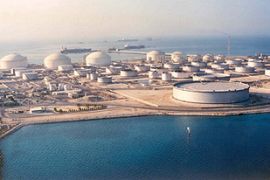Saudi says oil prices ‘in balance’
Comments set to anger Iran and Libya who want output cut at Opec summit in Vienna.

The Saudi kingdom, the world’s biggest crude oil producer, had come under fierce pressure in recent months from several countries, including the United States, to increase production in order to bring down record crude prices.
The country agreed in May and June to pump an extra 500,000 barrels per day (bpd) to help bring down prices which peaked at $147 a barrel in July, but have now fallen back to about $105.
‘Quiet’ solution
Chakib Khelil, the Opec president and Algerian energy minister, said on Monday that a production cut would be discussed by the group, which pumps 40 per cent of world oil.
 |
| Many Opec members would like to keep $100 a barrel as a benchmark level [AFP] |
“Everybody agrees that we will have an oversupply problem of between 500,000 and 1.5m bpd by early next year,” he said as he arrived in Vienna.
Before the meeting, many analysts had expected Opec to agree to trim its output informally before waiting until later, possibly at a scheduled gathering in December or before, to alter its official output target.
The trimming would be achieved by members, mainly Saudi Arabia, agreeing to cut excess production above their Opec quota, which would remove oil from the market but not amount to a formal change in policy.
This “quiet” solution to the problem of oversupply remains a possibility, with Iran pushing hard for greater adherence to the Opec quota system.
Saudi Arabia has been producing record amounts of oil, around 9.6m bpd in July, while its quota is for only 8.94m bpd.
Divisions
An Opec committee comprising of Iran, Nigeria and Kuwait that met on Monday to formulate a policy recommendation for the larger group broke up without agreement, according to Gholam Hossein Nozari, the Iranian oil minister.
“No recommendation,” he said as he headed back to his hotel late on Monday.
A senior Opec official said there was “still some division” on how the export group should proceed.
The stakes are different from the last time Opec met in March, when prices had broken through $100 a barrel and were on a steep upwards trajectory.
Now, with oil prices decreasing, many members would like to keep $100 a barrel as a benchmark level.
They argue producers face an uncertain outlook for oil demand, with economic growth slowing and consumers across the world taking measures to reduce their energy consumption as prices for heating and transport rise.
Oil fell to a new five-month low on Tuesday on expectations that Opec would leave formal output targets steady.